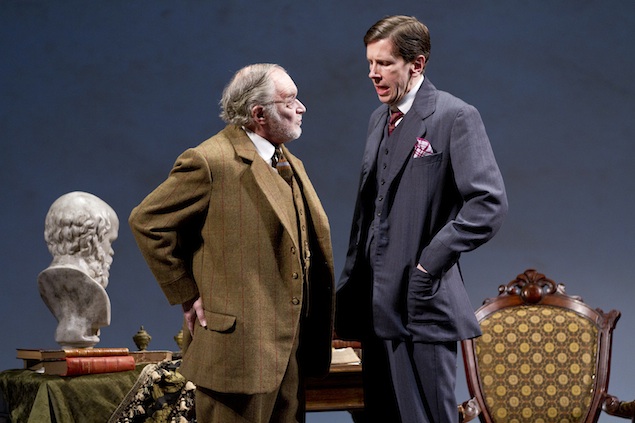
For embracing a gargantuan hog of a work such as Strange Interlude, and for deftly reducing it from its original running time of six hours to a much more manageable three hours and 45 minutes, Michael Kahn deserves a medal. His current production of Eugene O’Neill’s Pulitzer-winning 1923 play, which runs at Shakespeare Theatre’s Sidney Harman Hall through April 29, is tricky, intellectually dense, and still ferociously long, but it also offers a mesmerizing portrayal of Nina Leeds, one of the most emotionally complex and painfully human characters ever to grace the stage.
Strange Interlude seems like a labor of love for Kahn. The playbill states, “We wish to acknowledge that the text has been edited by the director, with huge admiration for the author, and in hopes that he would approve.” Nevertheless, even condensed the show is a weighty affair, full of psychology (O’Neill was undergoing the then-novel technique of psychoanalysis while writing it), dark subtext, and rich, poetic language. The characters speak their inner monologues to the audience, meaning it can be tricky to deduce what’s openly expressed and what isn’t–although most of the character’s most taboo utterances are said out loud, from Nina (Francesca Faridany) discussing having an abortion to her husband’s mother, Mrs. Evans (Tana Hicken) declaring she wished her son had been born dead.
The play follows the character of Nina Leeds through 25 years of her life, from her fiancé’s death in World War I to her husband’s death more than two decades later. From her first appearance in her father’s study, Nina is an odd duck, rendered nonsensical by grief and driven to fanciful and reckless behavior, to the despair of her father, Professor Henry Leeds (Ted van Griethuysen), and family friend Charles (Robert Stanton), who loves Nina in an oddly sexless way. Nina, whose relationship with her fiancé, Gordon, was never consummated, leaves home to work as a nurse and indulges in a series of casual affairs (she describes it to Charles as “giving my cool, clean body to men with hot hands and greedy eyes”), until, almost on a whim, she marries Sam Evans (Ted Koch), who’s dull but devoted. Her doctor friend, Ned Darrell (Baylen Thomas) believes having a family will give Nina the stability she so desperately needs.
Of course, serious American drama is rarely that simple, and O’Neill proceeds to put Nina through a maelstrom of emotional turmoil, most of which she handles with both neuroses and aplomb. It’s refreshing, even almost 90 years after Strange Interlude was written, to see a character become the center of the universe the way that Nina does, with a fleet of men orbiting around her: her husband, devoted Charlie, and Ned, who becomes her lover. Faridany has more than a hint of Hepburn (Katharine, not Audrey) in her portrayal of Nina–all plummy drawl, red hair, and thoughtlessness. She’s a strange mix of magnetism and hysteria, but she’s also richly, decidedly real.
Strange Interlude‘s fusion of heightened psychological truth, dark drama, and comedy (particularly in the last three acts) makes it feel more than a little reminiscent of AMC’s Mad Men (as Dr. Darrell, Thomas has a definite Don Draper air), and Nina’s cold pragmatism and whirling thoughts seem to have inspired many a great character, from Betty Francis to Blanche Dubois. Kahn emphasizes the retro feel by punctuating scenes with black-and-white movies, portraying a farm, typewriters, planes shot down from the sky. Projected onto the set’s vast white walls, in front of a deliberately sparse set, the scenes create an effect that is moody and evocative but that also consistently puts the action in its historical context. Jane Greenwood‘s costumes, by contrast, are less chronologically specific, seeming to refer more to the characters and their current state of mind than to their era.
In many ways, O’Neill’s play was ahead of its time (there’s talk early on of Nina “touching bottom” in her grief, long before the language of addiction and recovery was commonplace). Its intricate, textured style requires some grappling with, but there’s a real prize at the core of this impressive production.
Strange Interlude is at Shakespeare Theatre through April 29. Tickets ($20 to $100) are available through the theater’s website. Running time is three hours and 45 minutes.

















